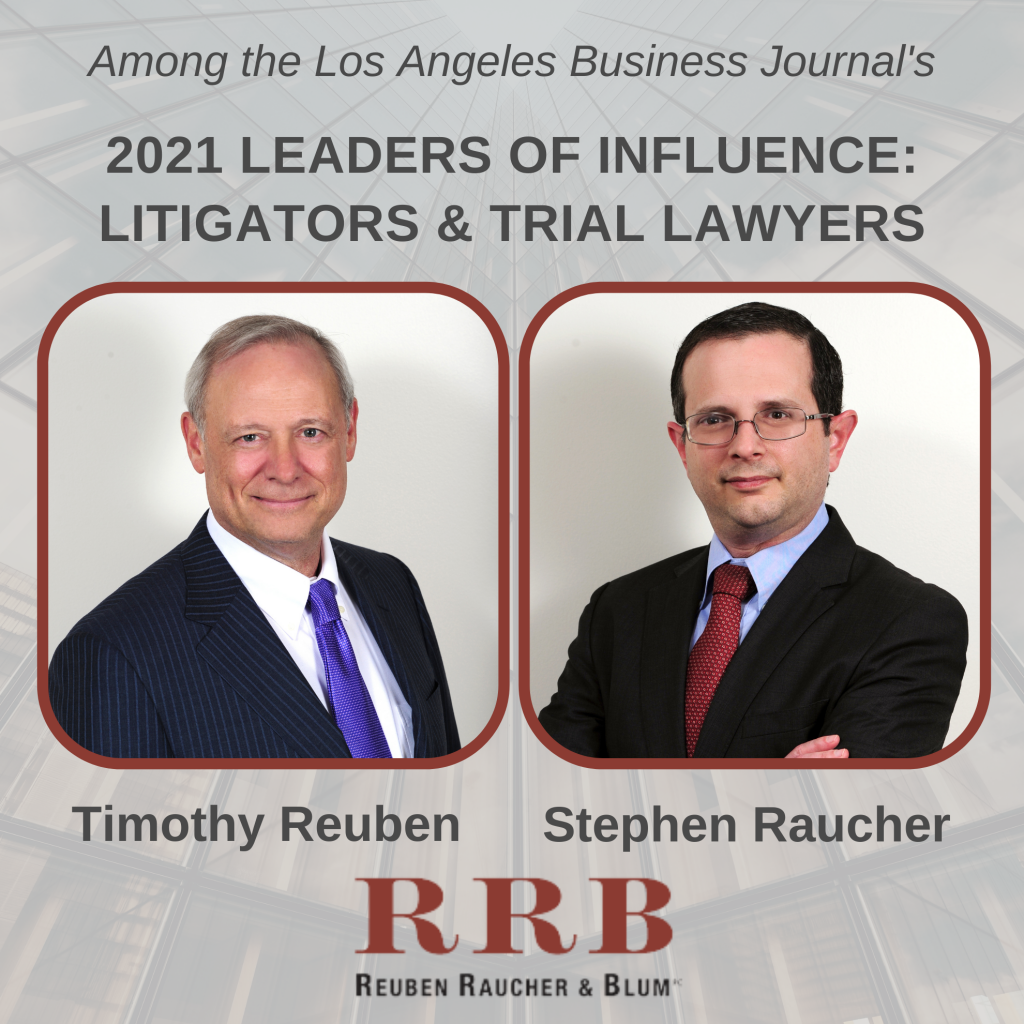Monthly Archives: July 2021
Why Won’t The Court Free Britney?
Why Won’t The Court Free Britney?
Timothy D. Reuben and Stephanie I. Blum’s article Why Won’t The Court Free Britney? is published in the Los Angeles Daily Journal on July 14, 2021.
Timothy Reuben and Stephen Raucher Named Top Litigators in Los Angeles
A Plaintiff Cannot be Compelled to Arbitrate the Threshold Question of Employee Status in a PAGA Claim

In Damaris Rosales v. Uber Technologies, Inc. (May 4, 2021) 2021 DJDAR 4243, the Court of Appeal, Second Appellate District, clarified that a plaintiff asserting a claim for civil penalties under the Labor Code Private Attorneys General Act of 2004 (“PAGA”; Lab. Code, § 2698 et seq.) cannot be compelled to arbitrate the threshold question of whether the plaintiff is an employee or an independent contractor for purposes of PAGA.
In Rosales, plaintiff Damaris Rosales (“Plaintiff”) alleged a single cause of action for wage violations under PAGA against defendant Uber Technologies, Inc. (“Uber”). Plaintiff was an Uber driver under a written agreement stating she was an independent contractor and all disputes between Plaintiff and Uber arising out of or related to the agreement, including disputes regarding wage and hour laws, would be resolved by arbitration under the Federal Arbitration Act (“FAA”). Uber brought a motion to compel arbitration, seeking an order compelling Plaintiff to delegate the issue of arbitrability to the arbitrator and to arbitrate the issue of whether Plaintiff was properly classified as an independent contractor under the parties’ arbitration agreement. The trial court denied Uber’s motion to compel arbitration, holding that “no part of the [parties’ arbitration agreement], including the delegation provision, binds the State of California, on whose behalf [plaintiff] brings the PAGA claim.” (Rosales, supra, 2021 DJDAR at p. 4243.)
The Court of Appeal affirmed the trial court’s order denying Uber’s motion to compel arbitration. Citing two recent Court of Appeal cases, the Rosales Court held that a PAGA plaintiff cannot be compelled to arbitrate whether he or she is an “aggrieved employee.” “[T]hreshold issues involving whether a plaintiff is an ‘aggrieved employee’ for purposes of a representative PAGA-only action cannot be split into individual arbitrable and representative nonarbitrable components.” (Provost v. YourMechanic, Inc. (2020) 55 Cal.App.5th 982, 996; see also Contreras v. Superior Court (2021) 61 Cal.App.5th 461, 472-472 [the preliminary question of whether the petitioners were “aggrieved employees” under PAGA “may not be decided in private party arbitration.”].) The Rosales Court also rejected Uber’s argument that, under the FAA, the parties’ agreement to delegate the issue of arbitrability to the arbitrator is enforceable.
It is a well-established rule in California that PAGA claims are not arbitrable because the state will not be a party to an employer and employee’s arbitration agreement. Rosales serves to clarify the broad scope of this rule by holding that a plaintiff cannot be compelled to arbitrate specifically the threshold question of whether the employee is an employee or independent contractor for purposes of PAGA.
Stephen L. Raucher Co-Authors Insurance Update for the Eighth Straight Year
Insurance Law is published by the State Bar Litigation Section in its California Litigation Review (2020 Edition), co-authored by RRB attorney Stephen L. Raucher, along with Michael Sohigian, who have provided insurance updates together for the eighth consecutive year.
